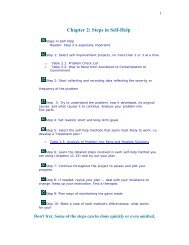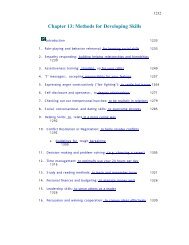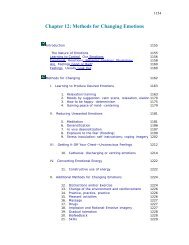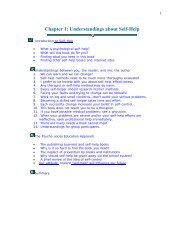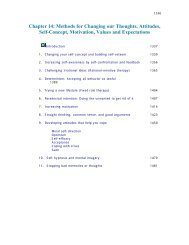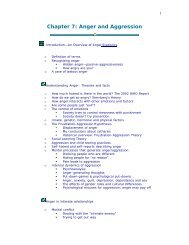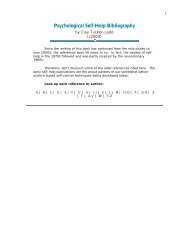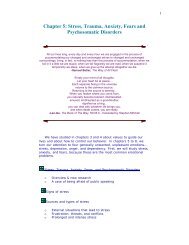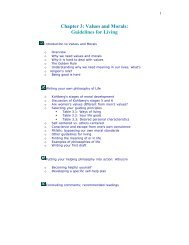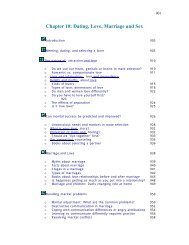Methods for Changing Behaviors - Psychological Self-Help
Methods for Changing Behaviors - Psychological Self-Help
Methods for Changing Behaviors - Psychological Self-Help
Create successful ePaper yourself
Turn your PDF publications into a flip-book with our unique Google optimized e-Paper software.
It is not easy to guess the unmet need. Since the need may never<br />
have been adequately satisfied, relieving a long-standing deficiency<br />
will probably be difficult.<br />
Effectiveness, advantages, and dangers<br />
Refer to the specific methods used. An advantage of this general<br />
theory and "method" is that the self-helper may be guided to find the<br />
"real" problem. Herein lies the danger as well, namely, one may falsely<br />
assume that a basic need is unmet, label oneself as deficient, and<br />
embark on an unnecessary self-improvement project.<br />
Recognize unconscious motives and defense mechanisms<br />
There is no doubt that sometimes we are not realistic. Not all of<br />
our actions are rational and intentional. Sometimes we avoid reality,<br />
we deny the truth, we fool ourselves. We may see the world the way<br />
we want to, not the way it is (example: a person falling in love or<br />
going through divorce). We may use excuses or rationalizations <strong>for</strong><br />
avoiding an unpleasant but important task (example: procrastination<br />
instead of studying or self-indulgence instead of thinking of others).<br />
We may seek hidden payoffs through some action (example: fat helps<br />
us avoid sex or putdown games build our ego). The purpose of these<br />
distortions and self-cons is to make us feel better about our behavior,<br />
to defend ourselves against anxiety, and/or to conceal an unworthy<br />
purpose.<br />
The self-evident solution to this self-deception is to be honest and<br />
realistic with ourselves. But how do we do this? There are powerful<br />
reasons <strong>for</strong> our distortion of reality; how can they be overridden? How<br />
can we deal with our own unconscious?<br />
This is much too large a topic to be covered in one method.<br />
Chapters 14 and 15 help us understand unconscious factors. If we<br />
understand our unconscious motives and distortions, we can intervene<br />
and counteract these <strong>for</strong>ces. The intention here is merely to draw your<br />
attention to a complex array of ideas and self-help methods that may<br />
need to be considered if you have an unwanted behavior that persists:<br />
1. Irrational ideas may exaggerate our problems, arouse very<br />
disturbing emotions, and/or provide excuses <strong>for</strong> unreasonable<br />
behavior--see chapter 14 <strong>for</strong> important explanations and<br />
solutions. Almost everyone has some irrational ideas. <strong>Changing</strong><br />
your behavior probably won't change your troublesome ideas.<br />
2. Attributions, assumptions, and conclusions are constantly being<br />
made by everyone. They aren't all logical and accurate. We are<br />
unaware that our thinking is not straight in many situations<br />
(see method # 8 in chapter 14). There are methods <strong>for</strong> doublechecking<br />
these assumptions, e.g. "I'm dumb" is testable and<br />
1095



